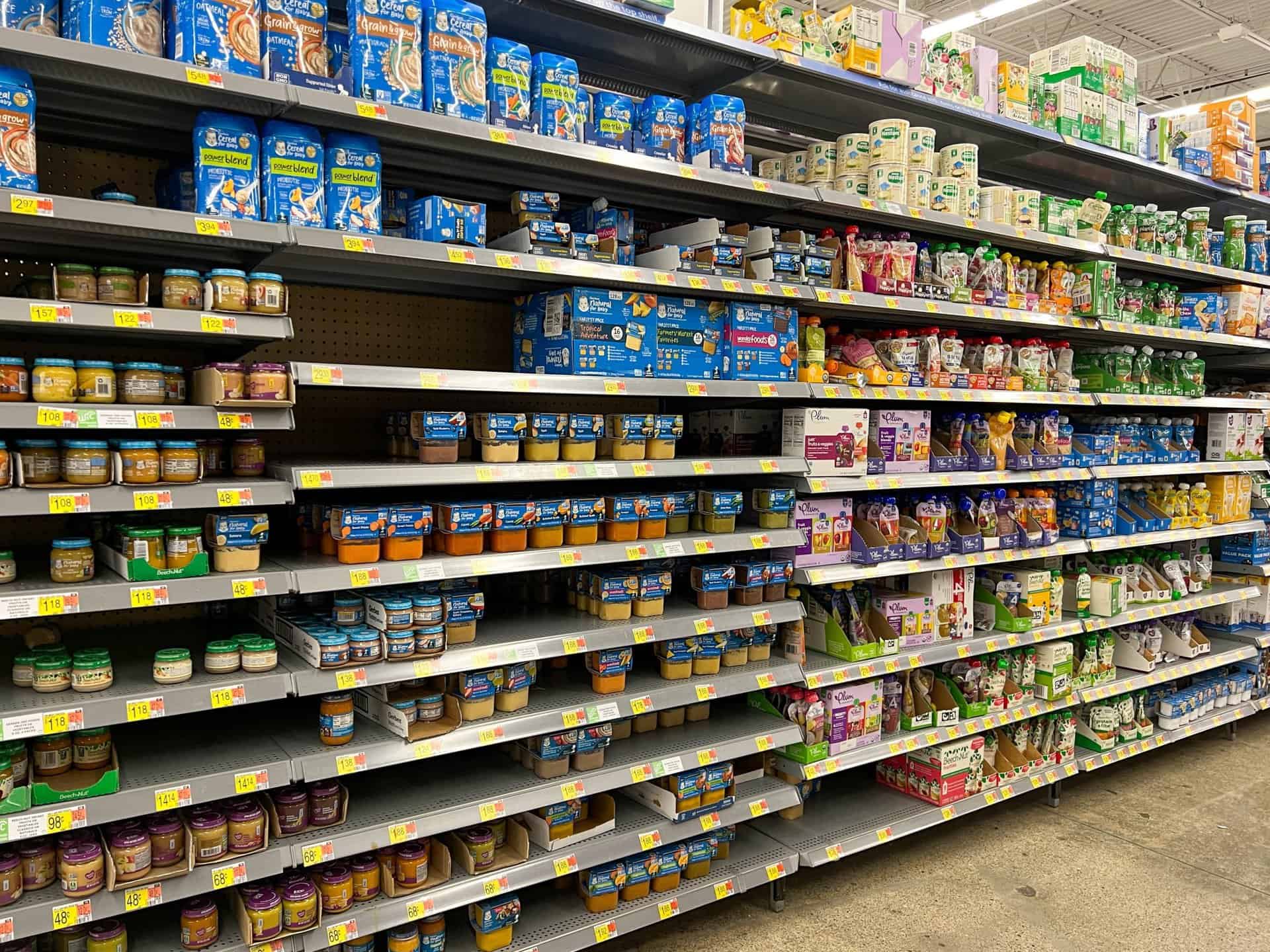Kroger Toxic Baby Food Lawsuit
- Last Updated: July 14th, 2025

Attorney Jessica Paluch-Hoerman, founder of TruLaw, has over 28 years of experience as a personal injury and mass tort attorney, and previously worked as an international tax attorney at Deloitte. Jessie collaborates with attorneys nationwide — enabling her to share reliable, up-to-date legal information with our readers.
Legally Reviewed
This article has been written and reviewed for legal accuracy and clarity by the team of writers and legal experts at TruLaw and is as accurate as possible. This content should not be taken as legal advice from an attorney. If you would like to learn more about our owner and experienced injury lawyer, Jessie Paluch, you can do so here.
Fact-Checked
TruLaw does everything possible to make sure the information in this article is up to date and accurate. If you need specific legal advice about your case, contact us by using the chat on the bottom of this page. This article should not be taken as advice from an attorney.
Key takeaways:
- Kroger baby food products have been found to contain alarming levels of toxic heavy metals, including lead, arsenic, cadmium, and mercury, which can cause serious health risks to infants and young children, such as mental retardation, neurocognitive disorders, behavioral disorders, and other severe developmental consequences.
- The Kroger toxic baby food lawsuit, part of a broader multidistrict litigation (MDL), alleges that Kroger sold baby food products with dangerous levels of toxic metals without adequately warning parents about the potential health risks. Bellwether trials will be scheduled to test the strength of the plaintiffs' claims and set important precedents for the litigation.
- The presence of toxic metals in Kroger baby food has sparked public concern, media attention, and advocacy for stronger regulations. The FDA is investigating and considering new regulations, while California has enacted a law requiring baby food manufacturers to test for toxic metals and publicly disclose the results by 2025.
Overview of the Kroger Toxic Baby Food Lawsuit
On this page, we’ll provide an overview of the Kroger toxic baby food lawsuit, health impacts of toxic metals in baby food, how to file a toxic baby food lawsuit, and much more.
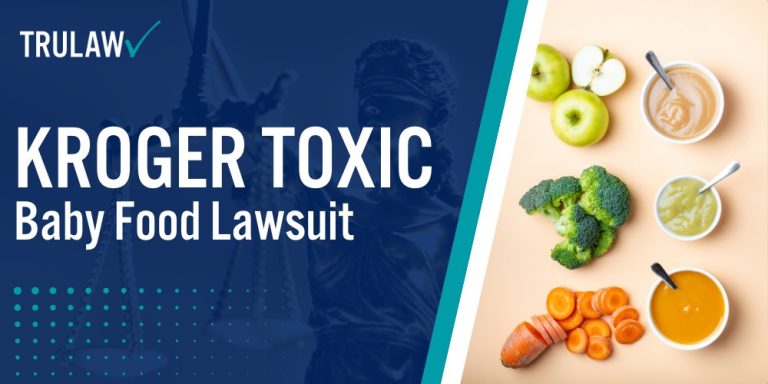
Intro to the Kroger Toxic Baby Food Lawsuit
Kroger has come under scrutiny due to high levels of toxic heavy metals found in its baby food products.
These heavy metals, including arsenic, lead, and cadmium, pose severe health risks to infants, potentially leading to developmental delays, neurological damage, and other serious conditions.
The Kroger baby food products containing the highest levels of heavy metal contamination include:
- Rice Cakes Whole Grain Salted
- Long Grain Enriched Rice
- Instant Oatmeal Original
- Rice Puffs
- Multigrain Baby Cereal
- Sweet Potato & Carrot Puffs
These products have been found to exceed the safe limits for heavy metals, making them a significant concern for parents.
For example, Kroger’s rice-based products, such as the Rice Cakes and Long Grain Enriched Rice, were identified as having particularly high levels of arsenic, sometimes exceeding 200 parts per billion (ppb), which is well above the FDA’s maximum allowable limit of 10 ppb for bottled water.
If your child has consumed Kroger baby food products and developed health issues such as neurological damage, decreased IQ, or behavioral problems, you may be eligible for compensation.
Contact TruLaw using the chat on this page to receive an instant case evaluation and determine your eligibility to join others in filing a Kroger baby food lawsuit today.
Table of Contents
Toxic Metals in Kroger Baby Food
The Kroger toxic baby food lawsuit stems from concerns over the presence of toxic heavy metals in baby food products sold by various retailers, including Kroger.
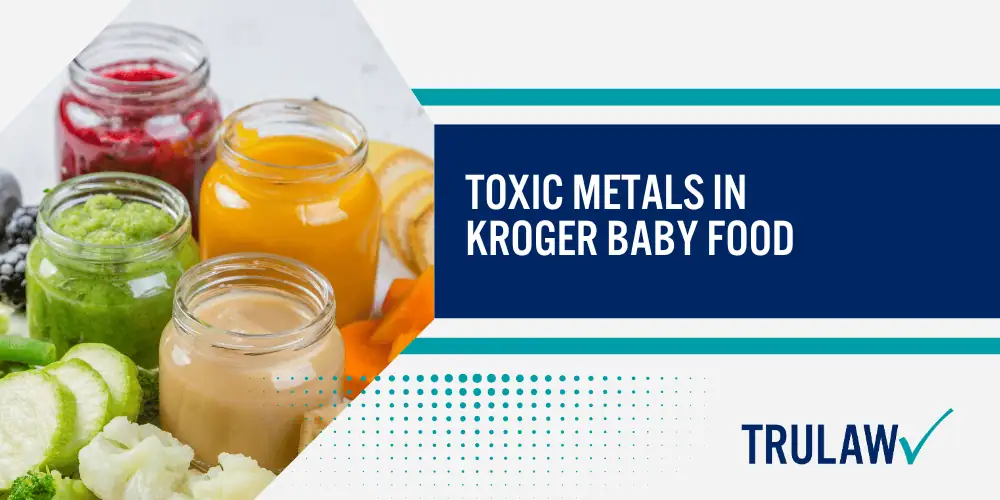
These metals, such as lead, arsenic, cadmium, and mercury, pose serious health risks, especially to infants and young children, due to their high toxicity and potential to cause developmental impairments.
Heavy Metal Contamination Identified in Kroger Baby Food
Independent laboratory testing has revealed that many popular baby food brands, including those sold by Kroger, contain alarming levels of toxic metals, far exceeding the levels allowed in other consumer products like bottled water.
A detailed investigative report by the U.S. House of Representatives Subcommittee on Economic and Consumer Policy confirmed these findings and highlighted the significant public health issue posed by these contaminants in baby food.
Scientific Studies on Health Risks Linked to Kroger Products
Scientific research has shown that the health implications of heavy metal exposure are more severe in children than adults due to the developing brain’s sensitivity to toxic insults.
Chronic exposure to these metals during critical developmental stages can lead to irreversible neurological damage, including:
- Mental retardation
- Neurocognitive disorders
- Behavioral disorders
- Other severe health consequences
These findings have prompted tighter regulations by the FDA and increased scrutiny of baby food safety standards, particularly for products sold by major retailers like Kroger.
Kroger Baby Food Lawsuit Proceedings
The Kroger toxic baby food lawsuits involve allegations that Kroger and its subsidiaries sold baby food products containing dangerous levels of toxic heavy metals without adequately warning parents about the potential health risks to their infants and children.
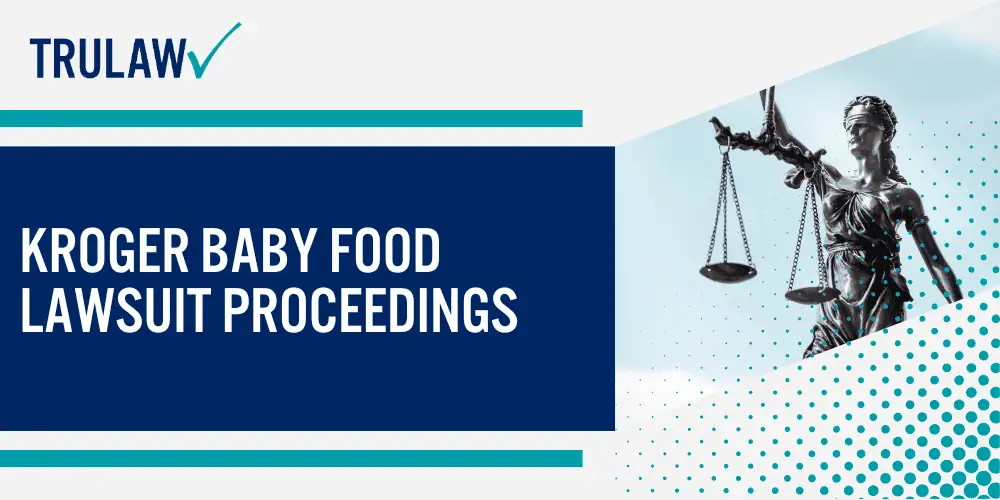
MDL Centralizes Kroger Baby Food Cases
The lawsuit against Kroger is part of a broader multidistrict litigation (MDL) that consolidates similar baby food lawsuits alleging personal injuries due to exposure to toxic heavy metals in baby food products.
The MDL aims to expedite the legal process and improve judicial efficiency by addressing common factual and legal issues collectively.
Key developments in the Kroger Baby Food MDL include, but are not limited to:
- The number of pending cases in the MDL surpassing a total of 30
- Four new cases were recently added to the MDL
- Defendants have raised objections regarding the scope of discovery requests, which are currently under negotiation
The consolidation of these cases highlights the widespread nature of the allegations against Kroger and other baby food manufacturers, emphasizing the need for a comprehensive resolution to ensure consumer safety.
Bellwether Trials Scheduled to Address Kroger Claims
As the Kroger baby food MDL progresses, bellwether trials will be scheduled to test the strength of the lawsuit claims and gauge the potential outcomes of future cases.
These initial trials will set important precedents for the litigation and may influence Kroger’s willingness to settle the remaining cases.
The results of the bellwether trials will be closely watched by both the plaintiffs and the defense, as well as the public and regulatory agencies, as they could have significant implications for the baby food industry as a whole.
Health Impacts of Toxic Metals in Kroger Baby Food
The presence of toxic heavy metals in Kroger baby food products poses severe health risks to infants and young children, who are particularly vulnerable to the harmful effects of these contaminants during critical stages of development.
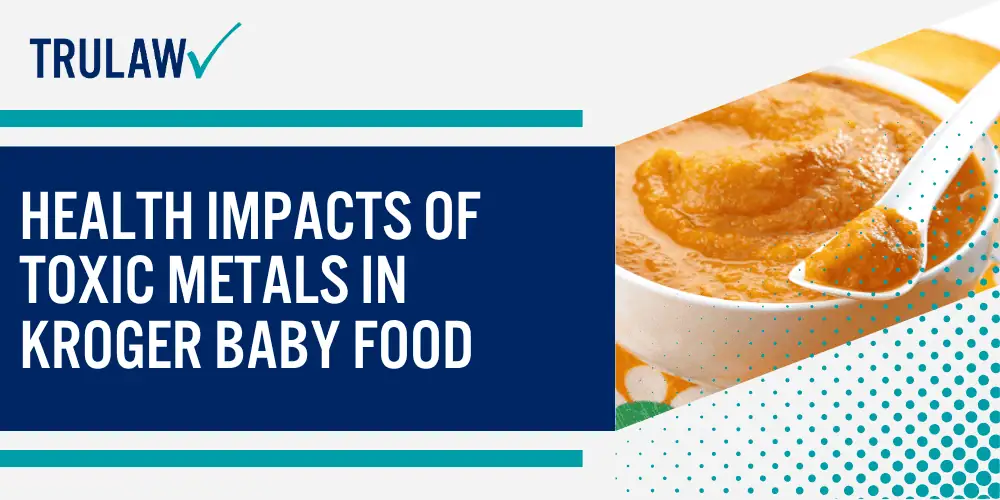
Developmental Disorders and Health Risks Linked to Kroger Baby Food
Exposure to toxic metals in baby food is a serious concern that has garnered significant attention in recent years.
These harmful substances can have long-term effects on a child’s development, impacting both their physical and cognitive growth.
Studies have shown that exposure to toxic metals in baby food can lead to various developmental disorders and health issues in children, such as:
- Decreased IQ and cognitive impairments
- Delayed speech and language development
- Behavioral problems and hyperactivity
- Increased risk of certain childhood cancers
- Damage to the nervous system and other organs
- Other severe health issues
These health concerns have led to a growing outcry from parents and consumer advocacy groups demanding stricter regulations and greater transparency from baby food manufacturers like Kroger.
Autism and ADHD Associated with Kroger Baby Food Consumption
Recent research has also suggested a potential link between the consumption of Kroger baby food products containing toxic metals and an increased risk of neurodevelopmental disorders such as autism spectrum disorder (ASD) and attention-deficit/hyperactivity disorder (ADHD).
While more studies are needed to establish a definitive causal relationship, the association between heavy metal exposure and these disorders has raised serious concerns among parents and healthcare professionals.
As the Kroger baby food lawsuit progresses, the potential long-term health consequences for children who have consumed these products will likely be a central focus of the litigation.
Regulatory and Legislative Actions on Kroger Baby Food
The revelations about toxic metals in Kroger baby food have sparked a series of regulatory and legislative actions aimed at improving product safety and increasing transparency for consumers.
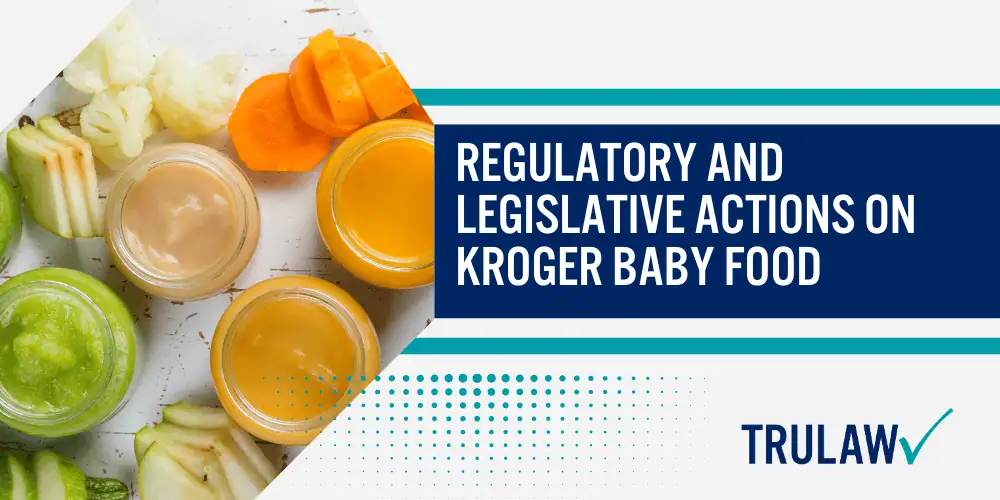
FDA’s Ongoing Investigations and Actions Regarding Kroger Products
The U.S. Food and Drug Administration (FDA) has initiated investigations into Kroger and other baby food manufacturers following reports of unsafe levels of heavy metals in their products.
The agency has faced criticism for previously failing to set and enforce strict standards for these contaminants in foods for infants and young children.
In response to growing public concern and the ongoing lawsuits, the FDA has pledged to reassess its policies and consider implementing new regulations to limit toxic metals in baby foods, which may include:
- Establishing mandatory testing and reporting requirements for baby food manufacturers
- Setting lower maximum levels for heavy metals in baby food products
- Requiring clear labeling to inform parents about the presence of toxic metals
- Other future implications of baby food regulations
These potential regulatory changes could have a significant impact on Kroger and other companies in the baby food industry, forcing them to adopt more stringent safety measures and increase transparency about their products.
New California Law Mandates Testing and Public Disclosure
In a groundbreaking move, California has enacted a new law that requires baby food manufacturers to test their products for toxic metals and publicly disclose the results.
This legislation, which goes beyond current FDA recommendations, aims to provide complete transparency to consumers by 2025.
The California law may serve as a model for other states and could potentially lead to similar federal regulations in the future.
This development underscores the growing recognition of the importance of ensuring the safety of baby food products and the need for stronger oversight of the industry.
This law, inspired by the ongoing concerns, was driven by the efforts of a California state court judge who highlighted the need for greater accountability from the manufacturers in district court.
Public and Consumer Reactions to the Kroger Baby Food Lawsuit
The Kroger baby food lawsuit and the broader issue of toxic metals in baby food have generated significant public concern and media attention, with parents and consumer advocacy groups calling for greater accountability and transparency from manufacturers.
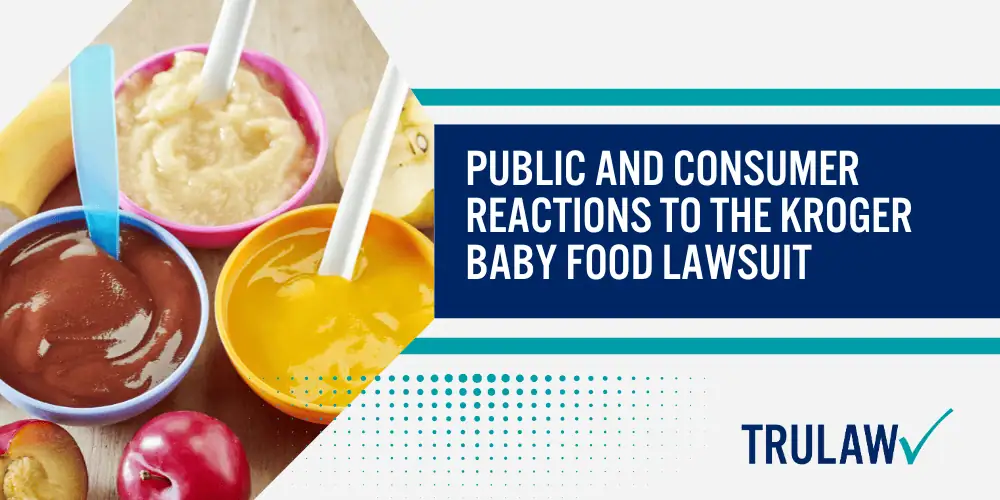
Public Concern and Media Attention on Kroger Baby Food Safety
As news of the lawsuit and the presence of heavy metals in Kroger baby food products has spread, parents across the country have expressed outrage and concern for their children’s health.
Social media platforms have become hubs for discussion and information-sharing, with many parents vowing to avoid Kroger products until the company can demonstrate improved safety standards.
The widespread media coverage of the issue has also put pressure on Kroger and other baby food manufacturers to address public concerns and take meaningful steps to reduce the levels of toxic metals in their products.
Advocacy for Stronger Baby Food Regulations
Consumer advocacy organizations and public health groups have seized on the Kroger baby food lawsuit as an opportunity to push for stronger regulations and oversight of the baby food industry.
These groups argue that the current lack of strict standards and enforcement has allowed companies like Beech Nut Nutrition and Kroger to prioritize profits over the safety and well-being of vulnerable infants and young children.
Advocates are calling for a range of measures to protect consumers, including:
- Mandatory and regular testing for toxic metals in baby food products
- Strict limits on the allowable levels of these contaminants
- Clear and prominent labeling to inform parents about the presence of heavy metals
- Increased funding for research on the health effects of toxic metal exposure in early childhood
As the Kroger baby food lawsuit progresses and public awareness of the issue grows, the pressure on regulators and lawmakers to take decisive action to ensure the safety of baby food products will likely continue to mount.
The outcome of this litigation and the regulatory response could have far-reaching implications for the future of the baby food industry and the health of countless children.
Some consumers are also voicing concerns about baby teething wafers, often marketed as safe, yet also found to contain these toxic metals, further expanding the scrutiny on baby food products.
Legislative and Corporate Reforms
As more information becomes public, the push for legislative action continues to grow.
The Baby Food Safety Act, a proposed bill, seeks to set stringent limits on toxic metals in all baby food products, including those labeled as organic foods.
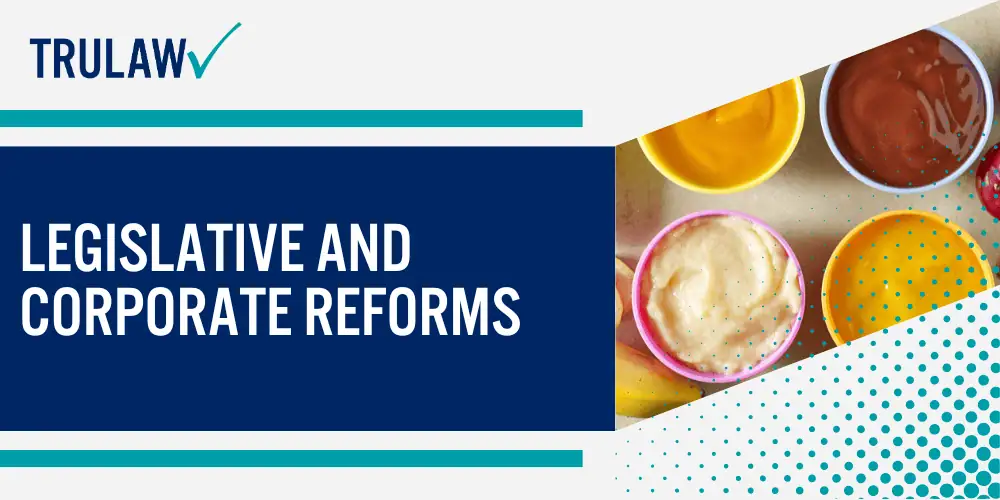
The act is part of a broader movement to hold companies accountable, particularly large chains like the Kroger Company, that have a significant influence on the market and the health of future generations.
Toxic Baby Food Lawsuit Frequently Asked Questions
-
The Kroger toxic baby food lawsuit alleges that Kroger sold baby food products containing dangerous levels of toxic heavy metals without adequately warning parents about the potential health risks.
The lawsuit is part of a broader multidistrict litigation (MDL) that consolidates similar cases against baby food manufacturers.
-
Exposure to toxic heavy metals in Kroger baby food can lead to various developmental disorders and health issues in children, such as decreased IQ, delayed speech and language development, behavioral problems, and an increased risk of certain childhood cancers.
Studies have also suggested a potential link between the consumption of Kroger baby food and neurodevelopmental disorders like autism and ADHD.
-
The U.S. Food and Drug Administration (FDA) has initiated investigations into Kroger and other baby food manufacturers following reports of unsafe levels of heavy metals in their products.
The agency is considering implementing new regulations to limit toxic metals in baby foods, including mandatory testing, reporting requirements, and lower maximum levels for these contaminants.
-
California has enacted a new law that requires baby food manufacturers to test their products for toxic metals and publicly disclose the results by 2025.
This groundbreaking legislation aims to provide complete transparency to consumers and may serve as a model for other states and potential federal regulations in the future.
-
The Kroger baby food lawsuit has generated significant public concern and media attention, with parents expressing outrage and concern for their children’s health.
Consumer advocacy organizations have seized on the lawsuit as an opportunity to push for stronger regulations and oversight of the baby food industry, calling for mandatory testing, strict limits on contaminants, and clear labeling.
-
As of July, the total number of pending cases in the MDL reached 31, with four new cases recently added.
The MDL aims to expedite the legal process and improve judicial efficiency by addressing common factual and legal issues collectively.
Bellwether trials will be scheduled to test the strength of the plaintiffs’ claims and set important precedents for the litigation.
-
No, as of 2024 individual claims are consolidating under a multidistrict litigation against baby food manufacturers.
Contact TruLaw using the chat on this page to receive an instant case evaluation.

Managing Attorney & Owner
With over 25 years of legal experience, Jessica Paluch-Hoerman is an Illinois lawyer, a CPA, and a mother of three. She spent the first decade of her career working as an international tax attorney at Deloitte.
In 2009, Jessie co-founded her own law firm with her husband – which has scaled to over 30 employees since its conception.
In 2016, Jessie founded TruLaw, which allows her to collaborate with attorneys and legal experts across the United States on a daily basis. This hypervaluable network of experts is what enables her to share the most reliable, accurate, and up-to-date legal information with our readers!
Additional Toxic Baby Food Lawsuit resources on our website:
Here, at TruLaw, we’re committed to helping victims get the justice they deserve.
Alongside our partner law firms, we have successfully collected over $3 Billion in verdicts and settlements on behalf of injured individuals.
Would you like our help?
At TruLaw, we fiercely combat corporations that endanger individuals’ well-being. If you’ve suffered injuries and believe these well-funded entities should be held accountable, we’re here for you.
With TruLaw, you gain access to successful and seasoned lawyers who maximize your chances of success. Our lawyers invest in you—they do not receive a dime until your lawsuit reaches a successful resolution!
AFFF Lawsuit claims are being filed against manufacturers of aqueous film-forming foam (AFFF), commonly used in firefighting.
Claims allege that companies such as 3M, DuPont, and Tyco Fire Products failed to adequately warn users about the potential dangers of AFFF exposure — including increased risks of various cancers and diseases.
Depo Provera Lawsuit claims are being filed by individuals who allege they developed meningioma (a type of brain tumor) after receiving Depo-Provera birth control injections.
A 2024 study found that women using Depo-Provera for at least 1 year are five times more likely to develop meningioma brain tumors compared to those not using the drug.
Suboxone Tooth Decay Lawsuit claims are being filed against Indivior, the manufacturer of Suboxone, a medication used to treat opioid addiction.
Claims allege that Indivior failed to adequately warn users about the potential dangers of severe tooth decay and dental injuries associated with Suboxone’s sublingual film version.
Social Media Harm Lawsuits are being filed against social media companies for allegedly causing mental health issues in children and teens.
Claims allege that companies like Meta, Google, ByteDance, and Snap designed addictive platforms that led to anxiety, depression, and other mental health issues without adequately warning users or parents.
Transvaginal Mesh Lawsuits are being filed against manufacturers of transvaginal mesh products used to treat pelvic organ prolapse (POP) and stress urinary incontinence (SUI).
Claims allege that companies like Ethicon, C.R. Bard, and Boston Scientific failed to adequately warn about potential dangers — including erosion, pain, and infection.
Bair Hugger Warming Blanket Lawsuits involve claims against 3M — alleging their surgical warming blankets caused severe infections and complications (particularly in hip and knee replacement surgeries).
Plaintiffs claim 3M failed to warn about potential risks — despite knowing about increased risk of deep joint infections since 2011.
Baby Formula NEC Lawsuit claims are being filed against manufacturers of cow’s milk-based baby formula products.
Claims allege that companies like Abbott Laboratories (Similac) and Mead Johnson & Company (Enfamil) failed to warn about the increased risk of necrotizing enterocolitis (NEC) in premature infants.
Here, at TruLaw, we’re committed to helping victims get the justice they deserve.
Alongside our partner law firms, we have successfully collected over $3 Billion in verdicts and settlements on behalf of injured individuals.
Would you like our help?
